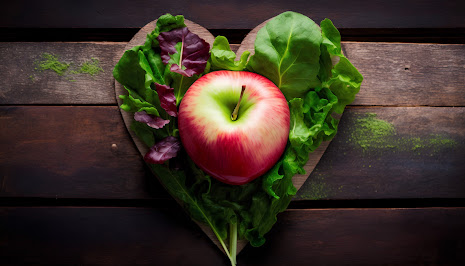Cardiovascular 💓 health with Lifestyle Medicine Part 2 – nutrition 🎋
Today I will talk about the benefit of the second pillar- Nutrition. Our nutrition levels can be a large contributor to our cardiovascular disease (CVD) risk. As a Lifestyle Medicine Practitioner, my goal is to help people prevent, improve or even reverse chronic diseases.
Never underestimate the power of food 🍲being medicine. Today I will introduce you to the importance of nutrition for heart and blood vessel health. Too often we fall into the trap of some new diet we have just heard about that will lead to phenomenal weight reduction. If it was recommended by a friend, we may just jump into it, no questions asked. What we often fail to analysis, is the importance of nutrition in the new diet we’ve been introduced to. Good nutrition is essential for high quality cardiovascular function. An example of fruit 🍓 and vegetables🍆, the lifestyle Medicine 🌿approach is to select food as packages, so include a rainbow 🌈 of multicolored fruit and vegetables, this will give you a wider variety of vitamins, amino acids, phytonutrients, carbohydrates, healthy fats, and protein. Isn’t this much simpler? Not only simpler, but also more inclusive from a nutrition perspective.
Whole foods 🌽are the best, which means the absolute minimum in any form of processing and packaging, and maximum fiber content. It keeps the glycemic index (GI) lower as well. Drink water 💧as your main beverage throughout the day. A minimum of processed food may be acceptable, but for your whole dietary portfolio, less processing keeps more fiber and nutrients in the food for you. The most suitable is a whole food diet rich in fruit and vegetables, whole grains🍞, legumes🫘, nuts and seeds. The American heart association recommends keeping our cholesterol intake down, with a preference for staying away from excessive red meat, organ meat, shellfish🍤, and cheese🧀, to help keep our saturated fat and cholesterol levels down. Although there are not many official recommendations for cholesterol intake, less than 200grams per day is considered advisable.
A large body of evidence demonstrated that the DASH diet (Dietary approaches to stop hypertension) led to the largest drops in blood pressure. This diet included the following attributes:
•
Rich assortment of fruit 🍎 and
vegetables🥦
•
Low fat dairy products 🍶
•
Low in dietary cholesterol
• Low in saturated fats and total fats
It can therefore be postulated fairly that the overall benefit to your heart health long term would be positively correlated with this result. Just reducing your risk of heart attack and stroke is indicating an important degree of reversing your heart disease risk through Lifestyle medicine intervention. Some people may still require cardiac medicines, but I can tell you some people have reduced their requirement for cardiac medicines, or been totally taken off them, with the assistance of Lifestyle Medicine intervention. How much power does that demonstrate for Lifestyle medicine? It speaks for itself. Do not ever underestimate the control you can have over CVD progression or regression.
Good nutrition 🌿 is also vitally important for helping in preventing Heart attack, stroke, angina pain, claudication pain, high blood pressure (Hypertension), overweight and obesity, Type 2 Diabetes, Alzheimer’s disease and facilitates healthy ageing. It aids better epigenetic states to lower the risk of cancer developing.
Reducing processed foods 🍿 🍩 🍔 and take away foods in your diet is valuable to decrease the content of unhealthy fats, excessive salt and sugar. I have a small recommendation to make to you when going out for a meal at a restaurant with friends and family, ask the waiter if they could speak to the Chef and prepare you a meal with their best fruit or vegetables 🥦 available on hand; and also ask if they can give you whole meal bread 🍞and any other legumes, nuts and seeds they have available. If you are choosing fish 🐟 or meat, request a low-fat cut without any sauce, which may cut down excess salt, sugar and fat in your dish. Many processed and bakery 🥐 food may hide hydrogenated fats called Trans fats, which are destructive to all the blood vessels including heart, brain and limb vessels. So read the food packages, and avoid trans fats, excessive meat and dairy saturated fats, salt and sugar. You will be so surprised what a difference this makes. Following the above dietary and nutrition advice may be the first step towards weight reduction, another way of reducing your CVD risk. But remember portion size may need to be reduced in some food. Speak to a Dietician before you make any dietary changes if you suffer from any diseases that you are being treated for or potentially may have and discuss it with your family doctor 🧑⚕️ also.
Stay away from refined food at home and try to select more whole food in your diet. These include fruit 🍇, vegetables 🫑, legumes 🫘, grains 🍞, nuts 🥜 and seeds. We want to keep processed food to a minimum to prevent from losing fiber and nutrition, including phytonutrients, minerals and vitamins. A predominately plant based diet🌿 with minimal processed food is best. Include whole grains in your diet, with low fat dairy products, like low fat cheese/yoghurt. Reduce sodium levels (salt) and stay away from high salt containing foods. Keep proteins lean, such as skinless chicken breast, fish 🐟 and beans. Red meats are recommended to be reduced to an absolute minimum or excluded. The diet we describe above can or at least should give you all the protein you require, without the excessive fat you get in red meats. Try to avoid high temperature cooking (ie: baking and frying) and favor high moisture and lower temperature cooking (ie: steam, boiling and simmering), which lowers unfavorable production of Acetylated Glycation end products (AGE’s).
Plant based diets🌿 such as the Mediterranean diet have been shown to reduce the risk of stroke and heart attack by 30%. Think about that when we start combining the other lifestyle medicine pillars. Other diets include vegan, pescetarian and flexitarian. Consider this, all the fat we eat in our diet mixes with cholesterol and ends up floating around in our blood vessels as a thickened substance, impeding good flow in our blood vessels, especially the tiny one cell wall blood vessels called capillaries. Isn’t it better to have a beautiful flow of blood through the vessel more like water, rather than a thick shake, so the blood can flow more efficiently? This in itself lowers our risk of unstable plaque formation in our blood vessels, stroke, heart attack, high Triglycerides, type 2 Diabetes, metabolic syndrome, and obesity. I trust this introduction into nutrition in relation to CVD has been helpful.
Where medical nutrition therapy is required in complex medical management scenarios for diseases, I will always refer to a registered Dietician or Nutritionist where perhaps a DASH diet or meal planning is required. In my practice I often make nutrition recommendations for specific needs, after gathering nutrition vital signs. Research has also demonstrated that the better quality of our dietary choices normally takes care of the portion size all by itself. Encouraging?
Next week we will move onto CVD and smoking
cessation, which is an extremely important Pillar of Lifestyle Medicine, which
I hope you also may choose to share with any friends, family or work colleagues
you may know who smoke. Thank you for joining me again today. Wherever you are,
I send my prayers to you for your health, happiness and prosperity 🎋. Bye for now!



Comments
Post a Comment